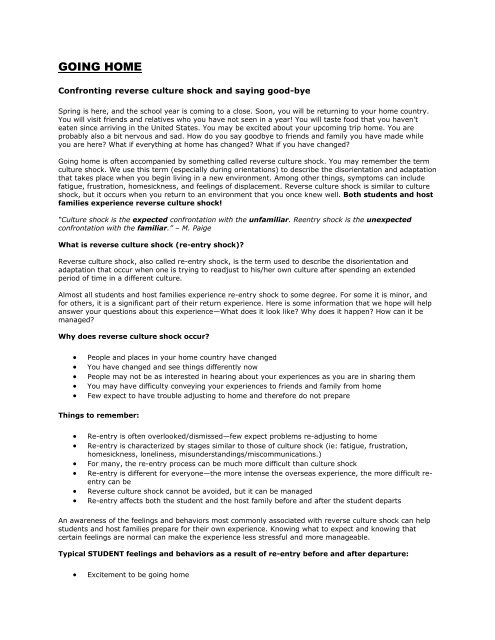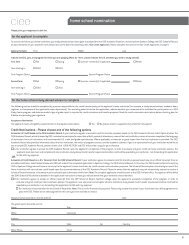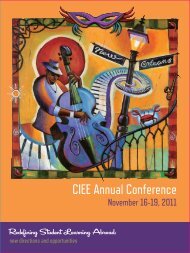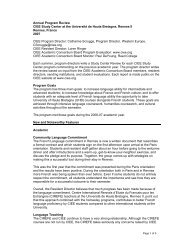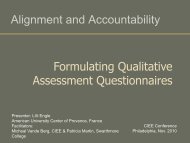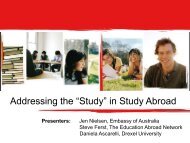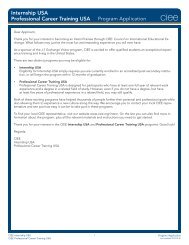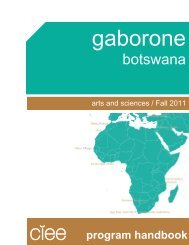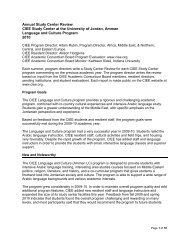Reverse Culture Shock
Reverse Culture Shock
Reverse Culture Shock
Create successful ePaper yourself
Turn your PDF publications into a flip-book with our unique Google optimized e-Paper software.
GOING HOME<br />
Confronting reverse culture shock and saying good-bye<br />
Spring is here, and the school year is coming to a close. Soon, you will be returning to your home country.<br />
You will visit friends and relatives who you have not seen in a year! You will taste food that you haven’t<br />
eaten since arriving in the United States. You may be excited about your upcoming trip home. You are<br />
probably also a bit nervous and sad. How do you say goodbye to friends and family you have made while<br />
you are here What if everything at home has changed What if you have changed<br />
Going home is often accompanied by something called reverse culture shock. You may remember the term<br />
culture shock. We use this term (especially during orientations) to describe the disorientation and adaptation<br />
that takes place when you begin living in a new environment. Among other things, symptoms can include<br />
fatigue, frustration, homesickness, and feelings of displacement. <strong>Reverse</strong> culture shock is similar to culture<br />
shock, but it occurs when you return to an environment that you once knew well. Both students and host<br />
families experience reverse culture shock!<br />
“<strong>Culture</strong> shock is the expected confrontation with the unfamiliar. Reentry shock is the unexpected<br />
confrontation with the familiar.” – M. Paige<br />
What is reverse culture shock (re-entry shock)<br />
<strong>Reverse</strong> culture shock, also called re-entry shock, is the term used to describe the disorientation and<br />
adaptation that occur when one is trying to readjust to his/her own culture after spending an extended<br />
period of time in a different culture.<br />
Almost all students and host families experience re-entry shock to some degree. For some it is minor, and<br />
for others, it is a significant part of their return experience. Here is some information that we hope will help<br />
answer your questions about this experience—What does it look like Why does it happen How can it be<br />
managed<br />
Why does reverse culture shock occur<br />
<br />
<br />
<br />
<br />
<br />
People and places in your home country have changed<br />
You have changed and see things differently now<br />
People may not be as interested in hearing about your experiences as you are in sharing them<br />
You may have difficulty conveying your experiences to friends and family from home<br />
Few expect to have trouble adjusting to home and therefore do not prepare<br />
Things to remember:<br />
<br />
<br />
<br />
<br />
<br />
<br />
Re-entry is often overlooked/dismissed—few expect problems re-adjusting to home<br />
Re-entry is characterized by stages similar to those of culture shock (ie: fatigue, frustration,<br />
homesickness, loneliness, misunderstandings/miscommunications.)<br />
For many, the re-entry process can be much more difficult than culture shock<br />
Re-entry is different for everyone—the more intense the overseas experience, the more difficult reentry<br />
can be<br />
<strong>Reverse</strong> culture shock cannot be avoided, but it can be managed<br />
Re-entry affects both the student and the host family before and after the student departs<br />
An awareness of the feelings and behaviors most commonly associated with reverse culture shock can help<br />
students and host families prepare for their own experience. Knowing what to expect and knowing that<br />
certain feelings are normal can make the experience less stressful and more manageable.<br />
Typical STUDENT feelings and behaviors as a result of re-entry before and after departure:<br />
<br />
Excitement to be going home
Sadness that the host family is making plans beyond your stay<br />
Tendency to withdraw from the host family—it may seem easier to say goodbye if you do not feel as<br />
close to your host family<br />
Confusion about why the host family may be pulling away from you<br />
Honeymoon period initially when returning home—it is great to be back and to see everyone<br />
Difficulty becoming accustomed to your own culture<br />
Tendency to compare everything to the U.S.—others are not as interested in these comparisons<br />
Homesickness for the U.S<br />
Questioning interests and what to do next<br />
Feelings that no one understands what you are going through<br />
Feelings that you have changed, but people expect you to be the same<br />
Typical HOST FAMILY feelings and behaviors as a result of re-entry before and after departure:<br />
<br />
<br />
<br />
<br />
<br />
<br />
<br />
<br />
Sadness that the student is making plans for after he/she gets home<br />
Looking forward to some privacy<br />
Tendency to withdraw from the student—it may seem easier to say goodbye if you do not feel as<br />
close to the student<br />
Frustration that the student may be withdrawing from you<br />
Sense of relief once the student is gone<br />
Dealing with withdrawal—sense of grief at the loss of the student<br />
Questioning interests and what to do next.<br />
Feelings of loneliness; “empty-nest syndrome”<br />
Now that you have seen some of the typical feelings and behaviors to expect, students and host families can<br />
work together to make re-entry as painless as possible. Separation and letting go is never easy. However,<br />
with every end comes a new beginning and we hope that students and host families will feel enriched as a<br />
result of this experience.<br />
Following are some suggested coping strategies for both the student and the host family to utilize both<br />
before and after the student departs. Hopefully, if you put some of these practices in place, you will be<br />
prepared to face the challenges that re-entry presents.<br />
Coping strategies for STUDENT and HOST FAMILY while student is still in U.S.:<br />
<br />
<br />
<br />
<br />
<br />
<br />
<br />
<br />
<br />
<br />
Recognition and awareness of reverse culture shock—be aware of the typical stages<br />
Prepare yourself by thinking about how you have dealt with culture shock<br />
Communication—students and host families should discuss the inevitability of the student’s<br />
departure. When making future plans beyond the program, acknowledge that it may be difficult for<br />
the other party to hear about them<br />
Understand that the other’s behavior may be affected by reverse culture shock<br />
Students should keep in touch with family and friends back home (within reason)<br />
Students and host families should be aware of news, changes, and trends within the student’s home<br />
community, city, and country<br />
Take some time for introspection—consider how you have learned, changed, and grown from the<br />
experience<br />
Compare both cultures—student, consider what aspects of American culture you would like to take<br />
home with you—host families, consider what aspects of the student’s culture you would like to<br />
incorporate into your life<br />
Bring closure to your experience—say “goodbye” and “thank you”, make a scrapbook together,<br />
make plans for continuing your relationship<br />
Discuss expectations for the student’s return home and whether or not they may be realistic—<br />
consider on what terms you are all hoping to keep in touch<br />
Coping strategies for STUDENT and HOST FAMILY when student is at home:
Be patient with yourself—adjustment takes time<br />
Realize that most people will not be as interested in your experiences as you are—be sure to<br />
express interest in others’ lives as well<br />
Connect with other study abroad students and host families who may be going through a similar<br />
adjustment<br />
Students, share your perspectives and expertise with community and school groups interested in<br />
learning about the U.S., American culture, or English language<br />
Host families, share your perspectives with others about your student’s country, culture, or<br />
language<br />
Be a mentor for others who are planning to study abroad or are currently abroad<br />
Be a mentor for other host families<br />
Students, encourage your family to host an exchange student<br />
Host families, you may want to host again, encourage others to host, or think about having your<br />
children study abroad<br />
Get involved in the international community in your locale<br />
Reflect—keep a journal or make a scrapbook<br />
Write letters or send e-mails to continue the life-long relationship you have been building with one<br />
another<br />
Students, find ways to incorporate American culture with your own culture<br />
Host families, find ways to incorporate your student’s culture with your own culture<br />
“What we call the beginning is often the end. And to make an end is to make a beginning. The end is where<br />
we start from.” – T.S. Elliot


